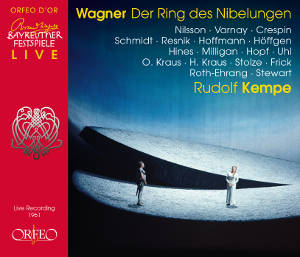WAGNER Der Ring des Nibelungen
View record and artist detailsRecord and Artist Details
Composer or Director: Richard Wagner
Genre:
Opera
Label: Orfeo
Magazine Review Date: 01/2017
Media Format: CD or Download
Media Runtime: 880
Mastering:
DDD
Catalogue Number: C928 613Y

Tracks:
| Composition | Artist Credit |
|---|---|
| (Der) Ring des Nibelungen: Complete |
Richard Wagner, Composer
Astrid Varnay, Soprano Bayreuth Festival Chorus Bayreuth Festival Orchestra Birgit Nilsson, Brünnhilde, Soprano Fritz Uhl, Siegmund, Tenor Gerhard Stolze, Loge, Tenor Gottlob Frick, Hagen; Hunding, Bass Grace Hoffmann, Mezzo soprano Hans Hopf, Siegfried, Tenor Herold Kraus, Mime, Tenor James Milligan, Wanderer, Bass Jerome Hines, Wotan, Bass Marga Höffgen, Erda, Alto Otokar Kraus, Alberich, Bass Peter Roth, Fafner, Bass Regina Resnik, Fricka, Mezzo soprano Régine Crespin, Sieglinde; Third Norn, Soprano Richard Wagner, Composer Rudolf Kempe, Conductor Thomas Stewart, Donner; Gunther, Baritone Wilma Schmidt, Freia; Ortlinde; Gutrune, Soprano |
Author: Mike Ashman
As a Brünnhilde used to Knappertsbusch in the 1950s there’s occasionally a sense that Astrid Varnay feels things a little slower in Die Walküre than Kempe (the War Cry, declarations in the Todesverkündigung). But she still carries terrific authority, top notes are given out with great confidence and her control and use of text (subtly manipulative in her final debate with Wotan) remain exceptional. Then star of the moment Birgit Nilsson was actually the same age as Varnay, although only allowed to debut as the Festival’s Brünnhilde in 1960. She is in fresh, incisive voice – although not without the odd tuning glitch (a problem of the house’s unique stage/pit relationship?). She certainly makes a grand sound when it counts but is some way from the emotional understanding of the role (or of Isolde) she was to achieve later in the decade with Karl Böhm and Wieland Wagner.
Early death took the young Canadian baritone James Milligan away from the German repertoire’s Heldenbariton roles in prospect after recording Walton and Sullivan under Malcolm Sargent. His Bayreuth debut as the third Wotan was ecstatically praised. Yet, while the high tessitura of the Wanderer holds no problems for him and he shows evident vocal energy and drive in Wagner’s long lines, he sounds actively too young and his characterisation is that of a beginner. Jerome Hines’s Wotans are likewise technically well achieved and paced but lacking in the Shakespearean detail of Hans Hotter. It’s all rather plain Jane – try in Die Walküre the continuing crises of Act 2 with Fricka and then his ‘confession’ to Brünnhilde: good solid vocalism but little colour or intent.
Hans Hopf’s timbre is an acquired taste but his Siegfried is strong, well paced and rhythmically alert. Fritz Uhl’s Siegmund, in this acoustic, sounds much more of the genuine article than he did as Decca’s first Tristan. Gerhard Stolze’s Loge is acutely acted and timed, and (as yet) devoid of the vocal mannerisms that cloud his famous records for Solti and Karajan. Herold Kraus is an affecting and unhackneyed Mime. The contribution (aka tasteful controlling hand) of conductor Kempe is most audible in these performances, as it is in his continued championing of the Czech exile Otakar Kraus as Alberich. Not in the gruff vocal tradition of Gustav Neidlinger, Zoltán Kelemen or Ekkehard Wlaschiha, Kraus may sound less black than these Nibelung rivals but he is not a whit less evil or frightening. Kempe’s hand surely can also be felt in the casting of Marga Höffgen as Erda – her more mezzo-soprano than contralto tones permitting a huge amount of text to come over clearly – and the lyrical beauty of the smaller female roles, not to mention Régine Crespin’s vulnerable Sieglinde.
Discover the world's largest classical music catalogue with Presto Music.

Gramophone Digital Club
- Digital Edition
- Digital Archive
- Reviews Database
- Full website access
From £8.75 / month
Subscribe
Gramophone Full Club
- Print Edition
- Digital Edition
- Digital Archive
- Reviews Database
- Full website access
From £11.00 / month
Subscribe
If you are a library, university or other organisation that would be interested in an institutional subscription to Gramophone please click here for further information.




